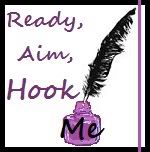Word choice is huge when it comes to writing. In one of the Reluctant Hook’er’s posts, she did her best to convince us that even the first word is important. Some may agree, and others won’t. I know someone who would agree—pre-Katie Holmes era.
At a recent writer’s convention, the Reluctant Hook’er and I wandered from class to class in our best Hook’er shoes and listened to published writer’s on various topics. One of the things that stuck out the most, besides one ladies’ Richard Simmon’s Style Hot Pink Sparkly mess of a hat, was making sure writing is show not tell.
So what was it about Tom Cruise’s “you had me at hello”? I know it was a movie but one of the most important things to do with your words is to make us forget we are reading, make us see it—like a movie.
Right before this scene, the show-me-the-money guy made his career with a great catch and a little dance. As cameras surrounded him, he took a call from his wife. We had already seen the couple’s relationship contrasted throughout the movie. Cuba and his wife loved each other. They kissed, pawed at each other, and fought with passion, all the while, Jerry and Bridget Jones exchanged awkward glances and feigned affection.
Jerry Maguire watched his client break down as he spoke to his wife. Jer had seen the love and devotion before. Only this time, he knew what he needed to do. We knew it too. It was a look. It was in his actions. The moment would not have been the same if he said, “I finally realize what I need to do. I need to go to go tell my wife she completes me.”
I know that sounds ridiculous and something you would never do in your writing, but I see it so many times. It’s called R.U.E. and if you’ve read my blog before you’ve probably seen it pop up. Resist The Urge To Explain in your writing. Don’t sell your reader short. We aren’t totally stupid. We get things. We can read between the lines.
Show us the need Jerry has for his wife, make us believe it, before the scene above even happens. We need the experience. We need to forget we’re reading a book. We need to root him on, still wondering if he’ll do what’s right.
So, let’s test your knowledge. Which of the following sentences is telling and which are showing?
1. 1. “I like your hat,” she said sarcastically.
2. 2. My mind stirred with trepidation.
3. 3. I saw the look in his eyes and I knew he wanted me.
4. 4. The jagged pieces of broken glass reminded me of my father, unapproachable and dangerous.
5. 5. The crisp evening bit at my cheeks, freezing my tears, it was then I knew I’d always be alone.
Show me your skills if you want. Rewrite any of the sentences you think are telling. Show me the money.







4 comments:
While I do respect the showing vs. telling argument, one fatal flaw exists:
Just because a character tells a reader something, doesn't make it true.
Characters most often lie to themselves, just like people in real life do. In fact, reading a story written in first person where characters SOMETIMES lie to themselves? Perfect! Who's being honest with themselves, who's in denial, who stands by their actions, who sticks by what they believe, who chooses to stay in a bad situation and why, these can all be taken advantage of by doing a minute amount of telling to the reader, that can't be displayed by just showing.
As a writer, I ALWAYS want to write characters that lie to readers. Whether they're stand-up, honest individuals, or sociopathic liars, I want my writing to lie to readers and make them think a story is going a certain way when in fact, much more is buried deep beneath.
Even if I give the reader the answer in some veiled message, I still want depth. As long as there's depth, in my opinion, telling can be okay sometimes.
In fact, I love it when people tell me HALF a story. It drives me to keep working to find out the other half. And in life, whenever a person tells you a story, there's always someone else's version to counteract it. If literally everything is shown about characters, yes, it can be powerful and fun to analyze. But how do you show a character that's lying to themselves without some cliche moment or forced scene where readers get "the real truth?"
For example:
"I don't love him anymore!"
"Then why are you still wearing his ring?"
Great, this was just shown, but so what? First off, how many people are detectives to notice that? Second, what about the people out there who don't love that person anymore AND don't wear that ring anymore? Sure, they can act out and be fidgety, but some people are ridiculously good at hiding their feelings. We have to wait till the end of the story to find out they were lying to themselves? Where's the tension in that? Moments like that are so overdone, showing that scene simply for the sake of showing is just as bad as a writer who tells every step of the story without an ounce of action.
Too much telling, too much showing, to me, it's all the same. A good writer needs to find the right balance.
You show a little, you tell a little, and a reader takes in this info and has to fish through everything to find the real truth. One person telling their side, another person telling their side, it can provide valuable red herrings and false prophecies. What's being told in the story that holds water based on action? What's being told that's just bullcrap? When do we root for a character to lie about something they did? When do we root for a character to just blurt their feelings out?
Some ends up being true, some ends up being false, and at the center, an engaging relationship between people can be found, because unlike in TV and movies, we have the extra edge of being inside the characters' minds.
I read because I get that extra info I don't get from interacting in real life. If all I'm getting is just watching people act, I'll go to the mall. I'll speed-date. I'll watch reality shows.
Hell, reality shows are likely a perfect example why a lot of people don't read. That's 100% showing action for people to analyze, and I think we can agree, reality shows are NOT where the real deep drama lies.
When I read, I want some insight into what people think. I don't mind if a writer tells me a little about what a character feels. Just like in real life, I will still be compelled to tell that person, "oh yeah? Prove it." :-)
Not sure if this is a trick, but I think all those sentences are telling.
You have some great points here.
I LOVE romances. I need to watch that movie again. :)
Marc, you are right as far as can't all be 100%. Telling is a way to further the story, but creating the experience has a lot to do with showing. I think you get caught up in the "don't do..." and you think we mean NEVER do something. It is simply a reminder to write smart, write detailed, and don't take away the experience from the reader. That's all. If you need to tell sometimes, then do it. In your example above with the ring. That was not telling. That was entirely showing. That's what I mean. Thanks for commenting. And yes, Meg the sentences were all telling. Great job. Anytime someone tells you how they are feeling, be wary. Unless of course it is followed or supported by action like in Marc's example which SHOWS the opposite. Elisabeth, good luck on your blog hop!! If anyone hasn't signed up they should.
Post a Comment